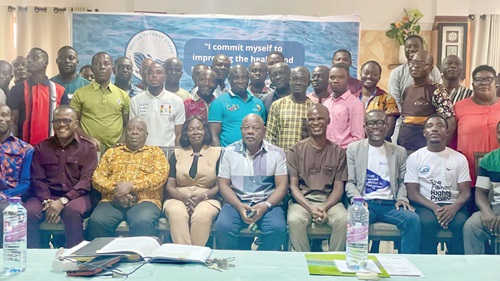Stakeholders in Ghana’s fisheries sector have renewed calls for better working and living conditions for artisanal fishers, following the country’s ratification of the International Labour Organisation’s (ILO) Work in Fishing Convention, C188.
Speaking at a two-day capacity building workshop in Accra, organised by Friends of the Nation and ProSea Marine Education under the Marine SafeNet Ghana project, participants stressed the need to extend labour protections to Ghana’s small-scale fishers.
The workshop was held as part of efforts to align the sector with international labour standards after Ghana ratified Convention 188 in August 2024.
The National Project Coordinator for the ILO 8.7 Accelerator Lab Project, Emmanuel Kwame Mensah, said the ratification of C188 marked a major step towards regulating labour rights in both the industrial and artisanal fishing sectors.
He explained that the Convention, which sets out standards on recruitment, safety, social protection and working conditions, requires Ghana to submit annual reports and involve all stakeholders actively.
“Implementation has already started,” Mr Mensah said. He noted that a tripartite committee involving the Labour Department, Fisheries Commission, Ghana Maritime Authority, unions and employers had been established.
Adapt
The Chairperson for the Work in Fishing Tripartite Committee, Awudu Inusah, explained that while the Convention primarily targets vessels over 24 metres in length, some of its provisions, including first aid, safety measures and medical certification, were being adapted for use in the artisanal sector.
He acknowledged that applying certain standards to smaller vessels presented challenges but said a gradual approach would help address these difficulties through continued engagement with fishing communities.
Representing the Minister of Fisheries and Aquaculture Development, the Director of the Marine Fisheries Management Division, Maame Esi Bordah-Quayson, said the ministry remained fully supportive of the Convention’s implementation. She called on all stakeholders to play their part “to ensure better working conditions for our seafarers.”
The Executive Director of Friends of the Nation, Donkris Mevuta, said the Marine SafeNet Ghana project, currently at its pilot stage, was working to raise awareness among fishers and promote the reporting of near-miss incidents at sea.
He added that bringing small-scale fishers into national conversations about safety and labour protections was long overdue. “Our engagements revealed an urgent need to address the safety challenges faced by artisanal fishers, who recorded several fatalities last year,” Mr Mevuta stated.
The Financial Manager and Course Leader at ProSea Marine Education, Thomas van Schie, shared a global perspective, quoting Food and Agriculture Organisation (FAO) figures which suggest that 88 fishers die every day worldwide, making fishing the most dangerous profession.
At the end of the workshop, a communiqué was presented by Nana Jojo Solomon, who is the President of the Ghana National Canoe Fishermen Council (GNCFC), and the National Fisheries Association of Ghana (NAFAG), on behalf of participants.
The communiqué formally accepted the provisions of the ILO Work in Fishing Convention and called on the government and relevant stakeholders to ensure its full implementation in the small-scale fisheries sector.
The communiqué stressed that the current working conditions of artisanal fishers require urgent attention, given the numerous risks faced at sea. It noted that while many provisions of the Convention are already being applied informally, there is a need for formalisation and documentation.
The workshop brought together representatives from the Ghana Maritime Authority, the Labour Department, the Ghana Industrial Trawlers Association, civil society organisations, canoe owners, fish processors and other groups.
Discussions covered matters such as safety standards, medical certification, working agreements, crew lists, and the need for formalisation efforts that reflect the realities of the artisanal fishing sector.
Participants called for the gradual implementation of the Convention’s provisions, recognising the need for continuous stakeholder consultations to tailor the standards to Ghana’s artisanal fishing context.
They resolved that fishers should sign agreements with canoe owners to promote order and clarity in working relationships and urged government support for training initiatives, including operationalising the Anomabo Fisheries College.

